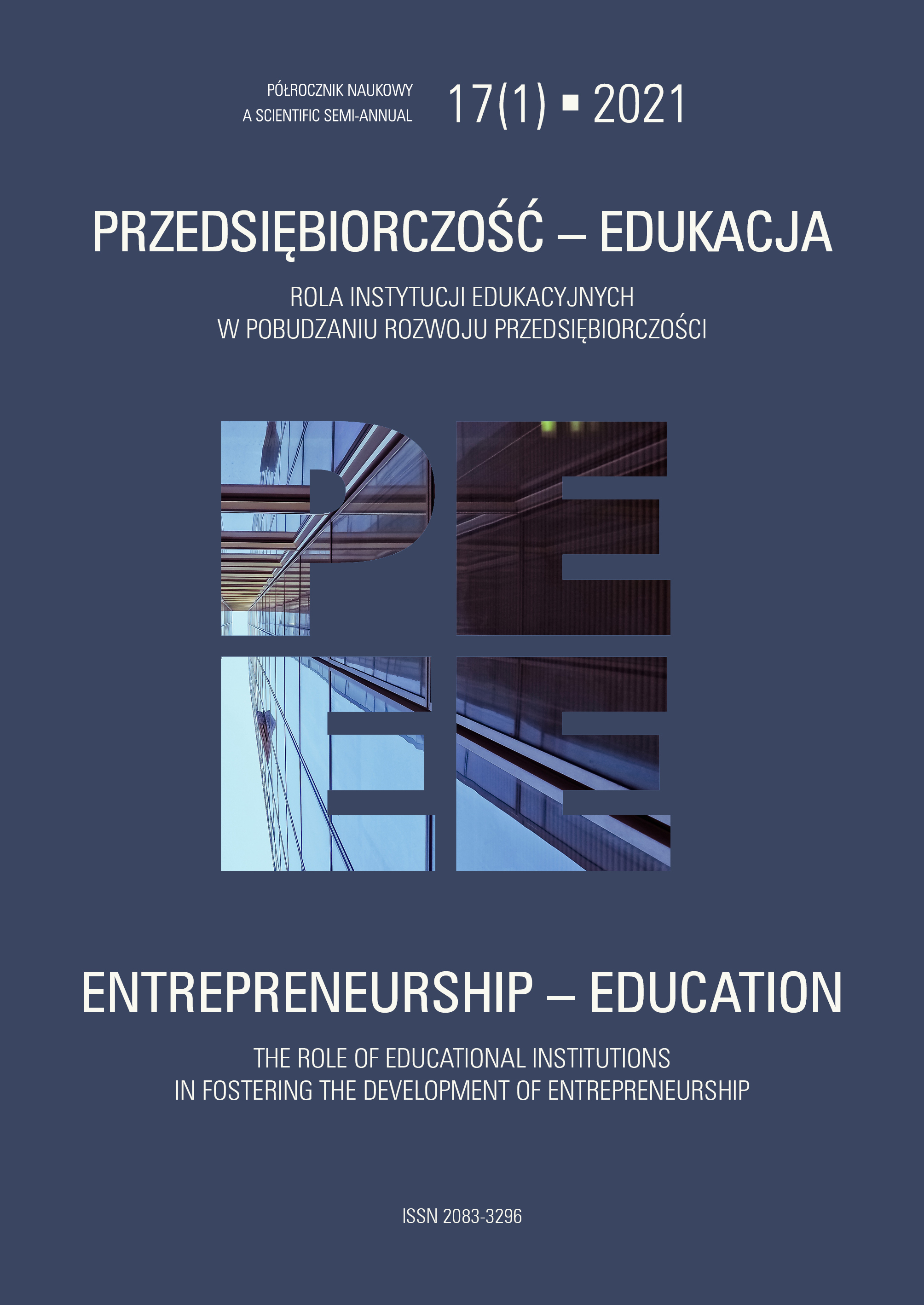Continuum of pedagogical values – methods and tools based on the example of the Greek model under variation conditions – cognitive analysis
DOI:
https://doi.org/10.24917/20833296.171.9Keywords:
crisis, education, heuristics, pedagogical values, the Greek modelAbstract
The aim of this article is to indicate the possibility of shaping the young generation by continuing the timeless pedagogical attitudes in the light of the current economic crisis. The subject of the analysis is to specify and adjust the available methods and tools of a modern pedagogue according to Greek philosophical and ethical systems in relation to the accompanying limitations and variability. A form of cognitive analysis has been chosen as an empirical method of research into the issues presented. This analysis becomes increasingly important in the context of current economic issues and global transformations caused by pandemics, and thus the change in learning mechanisms to hybrid and remote learning. Thus, this consideration focuses on the role of pedagogical values based on the assumptions of Greek philosophers as precursors of pedagogical thought in order to diagnose current needs and draw inspiration from their methodological achievements. As a result of the analysis, methods and tools for working with students on communication, individuality and experience by initiating social contacts with culture and language were identified. The importance of the relationship between teacher and student, based on partnership and empathy, was also given, which gives tangible benefits in the process of shaping the individual, protecting him/her from exclusion.
References
Brandes, D., Ginnis, P.(1994). A Guide to Student - Centred Learning. Hemel Hampstead: Simon & Schuster Education, 36–57.
Budzyński, M. (2021; 20 stycznia). Wychowanie do samowychowania i samoedukacji. Pozyskano z: https://ala.edu.pl/koncepcja
Chrzanowska, I., Szumski, G. (red.). (2019). Edukacja włączająca w przedszkolu i szkole. Warszawa: FRSE.
Czekańska-Mirek, B. (2016). Elementy coachingu jako narzędzie procesu nauczania i oceniania w dydaktyce języka obcego. Katowice: Wydawnictwo Uniwersytetu Śląskiego.
Danek, Z (2020). Lider o słabym głosie, czyli wizerunek własny Izokratesa. Meander, 75 (2020), 3–25.
Delikonstantinidou, A. (2020). Socrates Now or The Apology Project: From Greek Roots to Transnational Routes. Ex-centric Narratives: Journal of Anglophone Literature, Culture and Media, 4, 206–219.
Dembiński, B. (red.). (2000). W kręgu filozofii klasycznej. Katowice: Wydawnictwo Uniwersytetu Śląskiego.
Frodeman, R., Briggle, A. (2016). Socrates tenured : the institutions of twenty-first-century philosophy. London: Rowman & Littlefield International.
Jacko, J.F. (2017). Klasyczny ideał kształcenia a potrzeby społeczne. Kraków: Wydawnictwo Uniwersytetu Jagiellońskiego.
Jodłowska, B. (2016). Wokół początków pedagogiki. W trosce o powrót do Pedagogiki Sokratejskiej. Polska Myśl Pedagogiczna, 2, 83–99.
Gaj, B. (2020). Styl łacińskich traktatów Firmicusa Maternusa i Filastra z Brescii (IV w. p.n.e.). Stylistyka, 29, 411–423.
Giovanni, R. (2000). Historia filozofii starożytnej. Lublin: Katolicki Uniwersytet Lubelski.
Koutsoyiannis, D. Mamassis, N. (2021). From mythology to science: the development of scientific hydrological concepts in Greek antiquity and its relevance to modern hydrology. Hydrology and Earth System Science, 25. Pozyskano z: http://www.hess.copernicus.org
Krokiewicz, A., Domański, J. (2007). Gnothi seauton – Poznaj siebie!. Meander, 62(3–4), 197–210.
Krońska, I. (2001). Myśli i ludzie – Sokrates. Warszawa: Wiedza Powszechna.
Kwietniewska, M. (2020). Plato and Aristotle in the light of research on Indo-European culture. Kultura i Wartości, 29, 113–137.
Litak, S. (2010). Historia wychowania. Tom I. Kraków: WAM.
Łażewska, D. (2011). Filozofia dla pracujących. Józefów: WSGE.
Maliszewski, R. (2019). Rola dialogu w procesie wychowawczym. Pedagogika Społeczna, 1(71), 100–104. doi: 10.35464/1642-672X.PS.2019.1.06
Marek, S., Szymańska-Wieczorek, A. (2011). Przyczyny i przewidywane skutki kryzysu finansowego XXI wieku. Studia i Prace Wydziału Nauk Ekonomicznych i Zarządzania, 21, 228–234.
Morańska, D. (2017), Refleksyjne uczenie się w akademickiej edukacji zdalnej. Edukacja – Technika – Informatyka, 1(19).
Ogłoza, E. (2000). Metody nauczania w kształceniu literackim. Katowice: Wydawnictwo Uniwersytetu Śląskiego.
Śmigaj, J. (2010). Rozmowy tuskulańskie – Cyceron. Tom V. Warszawa: Agora.
Szyrwińska-Hörig, A. (2021). Problem słabości woli w filozofii Leibniza w kontekście wczesnonowożytnych indeterministycznych teorii wolności. Studia z Historii Filozofii, 1(12), 7–24.
Teodorovich, Z.B. (2021). O logosie w pismach Filona z Aleksandrii – ewolucja tematyki o logosie według doktryny metafizycznej Filona w starożytnej filozofii greckiej. Colloquium Journal, 1(88), 26–32.
Thagard, P. ( 2014). Kogniwistyka. W: Zalta, E.N. (red.). Cognitive Science. Stanford University. Pozyskano z: https://www.wikiwand.com/pl/Kognitywistyka#/Przypisy
Wasilewski, M. (2017). Pedagogika grecka – od Protagorasa do Posejdoniosa. Łódź: Wydawnictwo Uniwersytetu Łódzkiego.
Wojnowski, J. (2002). Wielka encyklopedia. Tom 11. Warszawa: PWN.
Zalewska-Jura, H. (2021). Sekret Chloris, czyli o greckich antroponimach w Pieśniach Horacego. Między oryginałem a przekładem, 1(51), 125–138.
Zalta, E.N. (red.). (2017). The Stanford Encyclopedia of Philosophy (Summer 2016 Edition). The Metaphysics Research Lab. Pozyskano z: http://plato.stanford.edu/
Zarzycki, L.(2012). Teoretyczne podstawowe wychowania. Jelenia Góra: Karkonoska Szkoła Wyższa.
Downloads
Published
How to Cite
Issue
Section
License
Articles are published under the terms of the Creative Commons License (CC BY-ND 4.0; Attribution– NoDerivs).

